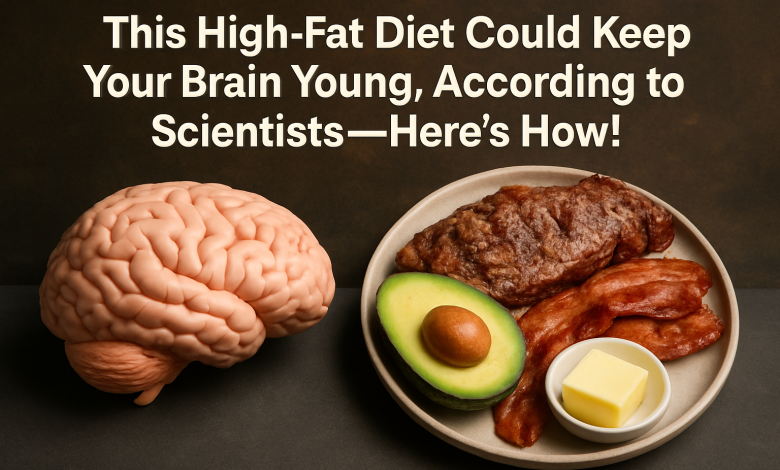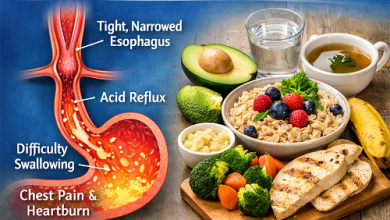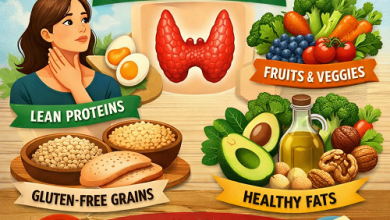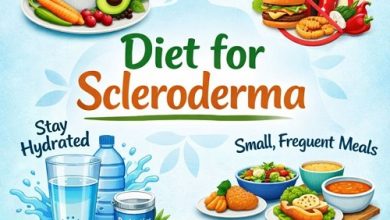This High-Fat Diet Could Keep Your Brain Young, According to Scientists — Here’s How!

Imagine waking up at 60, 70, or even 80 with mental energy, sharp memory, clarity of thought — as if your brain refused to age. Sounds like a dream? According to recent scientific discoveries, it might be more achievable than we think — not through magic, but through a carefully designed high-fat diet that nurtures your brain.
- Why conventional wisdom about “low fat is always better” might need rethinking.
- How certain high-fat diets can protect brain cells, boost cognition, and slow aging
- What the latest research says (and what to watch out for)
- How you can adopt a brain-friendly high-fat diet today — safely and effectively
- Realistic success stories and keys to staying consistent
Why Fat Has a Bad Rap (And Why It’s Not Entirely Fair)
For decades, we’ve been told: “Fat makes you fat. Stay away from fat if you want to stay healthy.” Saturated fats, trans fats, “bad cholesterol” — these phrases have dominated mainstream health messaging.
But here’s the twist: “fat” is not your enemy. The type of fat and the context of your diet make all the difference.
- Essential structural role: Fat is a major component of brain cell membranes. Without adequate fats (especially unsaturated ones), neurons lose flexibility, communication slows, and synapses become vulnerable.
- Energy backup: When glucose is low, fats/ketones can serve as an alternate fuel for your neurons.
- Signaling molecules: Certain fats influence hormones, inflammation, and gene expression in your brain.
- Misuse vs. abuse: Many negative studies on high-fat diets involve processed fats, ultra-refined oils, or combinations with high sugar — not the same as a clean, well-balanced high-fat eating plan.
That said, a blanket “eat all the fat you want” approach is neither smart nor safe. What researchers are now exploring is which high-fat diets, under what conditions, and in what forms, can actually protect and revitalize the brain.
The Science Behind “Brain Youth” and High-Fat Diets
The New Wave: Ketogenic / High-Fat, Low-Carb Diets & Brain Health
One of the most exciting angles emerges from ketogenic diets (high fat, very low carb). While these diets are known for weight loss and seizure control, their effects on brain aging are now under the microscope.
- According to a recent report, researchers at the University of Missouri found that switching to a high-fat, low-carbohydrate regimen might improve brain health in people at elevated Alzheimer’s risk.
- Some studies suggest that ketone bodies (produced during fat metabolism) may reduce oxidative stress, sustain mitochondrial function (the brain’s power plants), and promote neuroprotective pathways.
These results are still early, but they hint at a future where we use fat not as a risk, but as a tool for neuroprotection.
Contrasting Evidence: When High Fat Backfires
It’s important to balance enthusiasm with caution:
- In many animal studies, high consumption of saturated fats and certain trans fats has been associated with worse cognitive performance, increased oxidative stress, and brain inflammation.
- For example, in rodents fed a “western diet” or a fat-rich diet for weeks, researchers observed reduced BDNF (a key brain growth factor) and impaired learning/memory tasks.
- One striking finding: just three days of a high-fat diet triggered memory deficits and brain inflammation in older rats — even before overt metabolic problems appeared.
- Also, a single ultra–high–fat meal has been shown to impair blood vessel function in humans, reducing how well blood reaches the brain.
So, clearly not all fat is equal — and not every high-fat pattern is brain-friendly. The secret lies in which fats, how much, and what else accompanies them (carbs, antioxidants, and inflammation control).
Key Mechanisms: How High-Fat Diets May Preserve Brain Youth
Let’s peek under the microscope. What gives a properly designed high-fat diet its brain-protective potential? Here are some of the ways:
| Mechanism | What Happens | Brain Benefit |
| Anti-inflammatory signaling | Healthy fats (like omega-3s) modulate inflammatory pathways | Reduces chronic neuroinflammation, protects neurons |
| Mitochondrial support | Ketones improve mitochondrial efficiency; reduce damage | More energy, less oxidative stress |
| Better membrane integrity | Unsaturated fats maintain the fluidity of neuronal membranes | Faster signaling, improved synapse function |
| BDNF and growth factor stimulation | Some fats boost BDNF, which supports plasticity | Helps new connections, slows age-related decline |
| Autophagy/cell cleanup | In certain diets, cellular cleanup processes activate | Removal of damaged proteins & organelles |
| Alternate fuel (ketones) | Neurons get energy even when glucose is low | Stability during metabolic stress |
Understanding these molecular levers helps you shape a diet that leans toward nourishing rather than damaging.
Building a Brain-Friendly High-Fat Diet: The Rules That Matter
Your diet must be smart, safe, and sustainable. Here’s a roadmap.
Choose the Right Fats (Not All Fats Are Equal)
- Embrace unsaturated fats, especially monounsaturated (olive oil, avocado, nuts) and omega-3 polyunsaturated fats (fatty fish, flax, chia) — these are brain favorites.
- Be cautious with saturated fats — some moderate use (e.g., from grass-fed dairy, coconut) may be fine in balanced diets, but excess (especially from processed meats, fried foods) shows harmful associations in many studies.
- Avoid trans fats and ultra-processed fats outright — these are the ones most closely linked to oxidative and inflammatory damage.
Balance with Carbs — Don’t Go to Extremes Unless You Know Why
A purely zero-carb or ultra-keto extreme may stress some brains. Instead:
- Use low to moderate carbs, focusing on slow-digesting carbs (non-starchy vegetables, berries).
- Allow flexibility — for some people, cyclic or targeted carb intake (timed around workouts) may help maintain hormonal balance.
Add Antioxidants, Phytonutrients & Brain Allies
Because high-fat metabolism can stress cells, counteract it with:
- Colorful vegetables and berries (vitamin C, polyphenols)
- Spices like turmeric, cinnamon, and ginger
- Green tea, dark chocolate in moderation
- Vitamin E, magnesium, B-vitamins
- Precursors for brain repair (e.g., choline from eggs, lecithin, DHA supplements if needed)
Keep Inflammation & Insulin in Check
A brain-friendly high-fat plan must also:
- Keep blood sugar stable (to avoid brain insulin resistance)
- Avoid processed sugars and refined carbs
- Ensure adequate sleep, stress control, movement — diet alone won’t override chronic stress or sleep deprivation.t
Start Slow, Monitor, Adjust
- Don’t jump headfirst into 80% fat overnight. Gradually shift
- Monitor energy, mood, memory — use a journal
- Get periodic bloodwork (lipids, inflammation markers, liver enzymes)
- If you have existing health conditions (diabetes, cardiovascular disease), consult your physician — modifications may be required
Sample Brain-Smart High-Fat Meal Plan (One Week)
Here is a sample menu outline that focuses on brain-favoring fats, antioxidants, and steady energy.
| Meal | Example Foods / Recipes | Notes |
| Day 1 – Breakfast | Avocado egg bowls: eggs cooked in olive oil, avocado slices, sautéed spinach | Macronutrients: ~60–70% fat, moderate protein, low-carb |
| Lunch | Salmon salad with mixed greens, olive oil dressing, walnuts, berries | DHA-rich fish + good fats + phytonutrients |
| Snack | Handful of macadamia nuts + a few raspberries | Clean fats + fiber + antioxidants |
| Dinner | Grass-fed beef burgers wrapped in lettuce, a side of roasted broccoli & turmeric cauliflower | Balanced fats, minimal refined carbs |
| Dessert | Dark chocolate (70% +) or chia pudding with coconut cream | Occasional treat but with quality ingredients |
| Other days | Rotate in: mackerel, sardines, olive tapenade, egg muffins, nut butter smoothie (no sugar), eggplant, zucchini, low-carb stir-fry with avocado oil. |
You may intersperse higher-carb days (e.g., 20–30 g net carbs) depending on your tolerance and goals.
What the Latest Study in Neuron Revealed (and Why It’s a Game Changer)
In September 2025, a pivotal paper published in Neuron provided fresh insight: even short-term high-fat exposure can rapidly affect brain health — but the damage can be reversed under proper conditions.
Key takeaways:
- The study showed that neuronal circuits in the hippocampus (a key memory hub) respond rapidly to metabolic stress from high-fat diets.
- However, the brain is plastic. With the right interventions (e.g., restoring balance, mitigating oxidative stress), reversal is possible.
- This suggests we don’t need perfect diets forever — but periods of repair, reset, and smart nutrition can keep our brains young.
This gives hope: the path to a younger brain isn’t all or nothing — it’s about choices, cycles, recovery, and consistency.
Why It Matters To You
Before you scroll away, pause for a moment and imagine:
- Never forgetting your grandchildren’s birthdays
- Reading, solving puzzles, or creating art well into old age
- Conversing, strategizing, joking — with a mind that feels decades younger, not dulled
That’s not fantasy — it’s what many of the brain-protection pioneers are working toward. Your diet is perhaps the most direct tool you have. Each fat, each carb, each antioxidant — they whisper to your neurons: stay young, stay resilient, stay alive.
Also, when you tell friends or family, “I eat healthy fats to protect my brain,” you’ll spark curiosity — they will ask why, how, and what’s the method. You become a guide, not just a participant.
Addressing Doubts & Objections
“Won’t eating more fat make me gain weight or mess with my cholesterol?”
If you overdo any macro (fat, carb, or protein), weight gain can happen. But many people on high-fat, low-carb diets become fat-adapted — burning fat efficiently. Also, studies show that in such contexts, HDL often improves, and triglycerides drop. Of course, regular checks are key.
“I heard high-fat diets harm the brain — aren’t those studies convincing?”
Yes, many do show harm — but they often use poor-quality fats, overfeeding, sugar + fat combinations, or extreme models. That’s why it’s essential to pick clean fats, avoid processed junk, and balance nutrients. The emerging nuance is: some fats, in smart forms, may protect, while other fats will harm.
“I’m older; is it too late?”
Not at all. In fact, older brains are more vulnerable — so the potential benefit is greater. Studies indicate changes (damage or repair) can occur rapidly — sometimes within days or weeks. The Neuron paper even emphasizes reversibility.
“What about people with heart disease, high cholesterol, or diabetes?”
With those conditions, caution is wise. But many clinicians now use therapeutic keto / high-fat approaches even in metabolic disease — under supervision. The keys: careful monitoring, gradual shifts, and customizing to each person’s context.
Your 4-Step Plan to Start Today (Without Overwhelm)
- Audit your current intake
For 2–3 days, jot down what and how much you eat. Note fats, carbs, sugar, and processed items. - Clean your fat sources.
Remove or drastically reduce junk fats, ultra-processed oils, and fried fast food. Replace with nuts, olive oil, fatty fish, seeds, and avocado. - Gradually shift macros
Start with ~50–60% of calories from clean fats, moderate protein, low-medium carbs (e.g., 50–100 g net), then slowly push fat higher if comfortable. - Track cognitive signs & biomarkers
Use memory tests, journaling, or apps to see how your brain responds over 4–8 weeks. Get lab tests (lipids, inflammation, liver markers) every few months.
Bonus: Add movement (resistance training, walking), sleep hygiene, and stress control (meditation, breathing) — these amplify the benefits tremendously.
What To Watch Out For: Pitfalls & Mistakes
- Overeating “bad fats” — nothing reverses the harm of trans fats or oxidized oils
- Neglecting micronutrients — a high-fat diet can be deficient in vitamins and minerals if not carefully balanced
- Assuming instant magic — some benefits emerge quickly, others take months
- Ignoring personal tolerance — some people need more carbs, others less
- Failing to check labs — sometimes changes in lipids or liver markers need adjustment
What Scientists Are Exploring Next
- Personalized “neuro-ketogenic” diets tailored to one’s genetics, brain imaging, and biomarkers
- Combining high-fat with intermittent fasting or time-restricted eating for synergistic brain repair
- Drugs or supplements that mimic ketogenic effects (ketone esters, ketone mimetics)
- Deep-mapping how fats regulate epigenetics, microglia, and clearance of cellular waste (like beta-amyloid)
- Long-term human trials in aging populations to confirm whether these diets truly delay dementia
Final Thoughts: Your Invitation
We live in an age where diet books come and go, a n trends flicker. But the idea that the food you eat today can buy your brain years — that’s powerful. If you carefully choose which fats, balance carbs, support your whole body, and monitor your progress, you can become a living example of “brain youth.”
When you share this journey with others, you don’t just gain attention — you gain trust. People will see your clarity, your memory, your vitality — and ask: how did you do it? That’s your story. That’s your authority.
Let this article be your starting point. Use it, adapt it, personalize it. Let people connect with you — not just your content. And may your brain grow sharper, deeper, and more resilient with each passing year.




